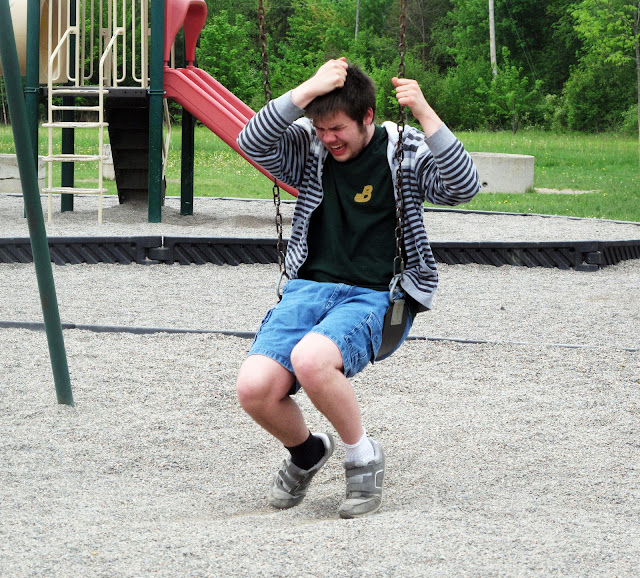




The pictures above were initially posted on this site on May 26, 2012, several months before Conor's 1st known Grand Mal Seizure in November. As I posted then, external conditions were perfect and Conor was enjoying a favorite activity in a favorite location when he suddenly began hitting himself in the head. I don't know what caused it, Conor lacks the communication skills to explain, but it was definitely internal. Together with many similar circumstances including sudden closing of his eyes and looking blankly into the distance I reported them to his pediatrician as possible seizure activities. The pediatrician did not disagree but did not want to provide medication in the absence of any falling behaviors. Two Grand Mal seizures later and a visit to a neurologist and Conor is just now starting on medication which will hopefuly reduce seizure activity.
My autistic son's second Grand Mal seizure, of which I am aware, happened when I was in an adjacent room less than 15 feet away this past Sunday. I heard the noises when his seizure began and recognized them this time for what they were. I jumped up immediately, laid him on his side and cushioned his head while his Mom called the excellent 911 emergency responders who took Conor to the local hospital, the DECH, for the excellent care and attention they have have always provided members of our family. (Including me during my recent hospitalization for a major asthma attack).
I was scared this past November when Conor suffered his first Grand Mal seizure. I was just as scared this second time. I can't believe that this can happen repeatedly without serious life threatening consequences especially if no one hears him during the night, or if it happens during swimming which he dearly loves. Conor was seen by a neurologist just 4 days earlier and we had, after some base line blood tests were done, started on the low dose end of a progressively heavier medication schedule. Hopefully as the dosage is increased and has time to take effect the seizures will cease.
Autism, as portrayed by most autism "awareness" groups, is far removed from the reality of severe autism with intellectual disability and sezures/epilepsy. I know it and the APA wizards who contrived the DSM5 ASD know it. Life will be easier for them and the researchers who conduct autism research while excluding those with intellectual disability, a trend which they have followed for many years and which is now condoned by the DSM5. The difficult conditions that are usually found with the severely autistic and make life difficult for autism researchers and clinicians ... intellectual disability, self injurious behaviors and seizures will be reduced substantially by being relegated to the invisible category of intellectual disability in the DSM5.
I look at the multitude of "autism" studies on Google Scholar and have no idea what most of them involve in terms of autism as a disorder or the serious conditions which are related to the severe forms of autism. I do know that very few of them address the severe realities faced by my son. I do know that when the APA spends several years "recompartmentalizing" the diagnostic criteria for autism and epilepsy to come up with the DSM5 ASD they are doing no one with severe autism any favors. Their efforts and funds would serve a far better purpose if they followed the lead of the emergency responders and hospital staff at the DECH who have treated Conor and cared for him so well. Focus on helping people with autism, particularly those most in need, and save the idle academic curiosity "autism" studies for your retirement.






0 التعليقات:
إرسال تعليق